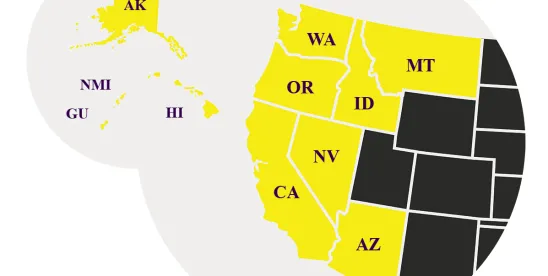Employers seeking to challenge California’s stringent independent contractor misclassification laws may have found an opening. On March 17, the Ninth Circuit Court of Appeals concluded that plaintiffs could proceed in their lawsuit on claims that California’s Assembly Bill 5, as amended (A.B. 5), violates the Equal Protection Clause. See Olson v. California, No. 21-55757, 2023 WL 2544853, at *2 (9th Cir. Mar. 17, 2023).
Background
A.B. 5 codified the “ABC test” for independent contractor misclassification the California Supreme Court articulated in DynamexOperations West, Inc. v. Superior Court of Los Angeles. See May 2018 GT Alert. A.B. 5 presumes an employment relationship, unless the hiring entity can demonstrate (A) the worker is free from the control and direction of the hiring entity in connection with the performance of the work, both under the contract for the performance of the work and in fact; (B) the worker performs work that is outside the usual course of the hiring entity’s business; and (C) the worker is customarily engaged in an independently established trade, occupation, or business of the same nature as that involved in the work performed. A.B. 5 was amended by A.B. 170 and A.B. 2257, which exempted a broad range of workers from the presumption of employment, including certain gig economy workers. However, ride-hailing drivers received no similar exemption.
Ninth Circuit Reinstates A.B. 5 Challenge
The Olson plaintiffs alleged that A.B. 5 violates the Equal Protection, Due Process, Contract, and Bill of Attainder Clauses of the U.S. Constitution and sought a preliminary injunction. The district court rejected each of these arguments. On appeal, however, the Ninth Circuit revived the Equal Protection claim.
Since A.B. 5 does not concern a suspect class or fundamental right, the Ninth Circuit applied rational basis review to ask whether the law is rationally related to a legitimate governmental interest. Even under this forgiving standard, the Court held that plaintiffs had plausibly alleged that A.B. 5 “violates the Equal Protection Clause for those engaged in app-based ride hailing and delivery services.” The Court noted that certain app-based gig companies with similar business models to plaintiffs received carve-outs under A.B. 5, while others, including plaintiffs, did not. According to the Court, the “piecemeal fashion” in which these exemptions were included in A.B. 5 supported plaintiffs’ allegations that the California Legislature specifically disfavored ride-hailing companies, as there is no indication that many of the exempted workers are “less susceptible to being exploited by being classified as independent contractors.” The Court also took note of numerous remarks by legislators singling out ride-hailing companies as targets for A.B. 5, concluding that these comments and the resulting legislation could plausibly be “attributed to animus rather than reason.”
In light of the Ninth Circuit’s holding, the district court will now reexamine whether the plaintiffs are entitled to preliminary injunctive relief. Given the stakes of A.B. 5 for the gig economy, there is surely more to come on this topic.
Jagpal Takhar also contributed to this article.



 />i
/>i

